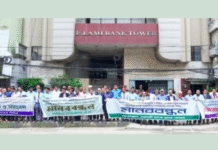
Several hundred export-oriented industrial units across the country were allowed to reopen on Sunday as the government eased the month-long nationwide shutdown to reduce the economic costs of the coronavirus pandemic.
As part of an incremental step to reopen all apparel manufacturing units gradually, Bangladesh Garment Manufacturers and Exporters Association (BGMEA) on Sunday reopened 502 of its member factories. Meanwhile, Bangladesh Knitwear Manufacturers and Exporters Association (BKMEA) reopened 104 of its 833 member factories on the same day.
Besides, 157 non-apparel industrial manufacturing units and around 150 apparel factories in three export processing zones (EPZs) in Chattogram have also resumed operation partially or fully. In addition to these, eight state-owned jute mills located in Khulna-Jashore region also resumed partial production on Sunday.
The government has also reopened public offices involved in providing emergency services to restart the economy that reels from stay-at-home order put in force since March 26.
“All the ministries, divisions and their subordinate offices involved in providing emergency services will remain open on a limited scale from Sunday during the extended general holidays,” says Sheikh Yusuf Harun, secretary to the Ministry of Public Administration.
On 23 April a decision was taken to keep 18 ministries and divisions open during the holiday, he continued, but later a letter was sent to all the ministries, divisions and their subordinate offices to remain open on a limited scale to provide emergency services.
According to the garment industry insiders, owners who have pending export orders wanted to resume production in their garment factories.
“Some factories have orders to ship those before the Eid festival,” said an exporter requesting not to be named. These orders are from the Middle Eastern and some European countries, he said.
Eid-ul-Fitr is the biggest festival for Muslims across the world. They live in America, Canada, Australia, Europe, and Africa. Buying new clothes is a part of the festival for Muslims before Eid.
Another exporter said currently he has no orders beyond June. “If things are not improved, the apparel industry would be in great danger,” he said.
BGMEA reopens 502 factories on first phase
Member factories of BGMEA resumed operations on Sunday with a limited number of workers amid the coronavirus crisis.
According to BGMEA officials, these factories are operating in full compliance with the recommended health guidelines such as maintaining social distancing while entering the factories, checking temperature, maintaining hygiene, and social distancing on the production floor.
According to BGMEA data, among the 502 factories that resumed operations on the first phase Sunday, 25 are located in the Dhaka metropolitan area, some 18 are in Narayanganj, 129 in Ashulia and Savar, 238 in the country’s largest industrial zone of Gazipur and Mymensingh. Ninety-two BGMEA member factories resumed operations in Chattogram on the day.
BGMEA sources said more factories will start gradually.
Jane Alam Khan, assistant superintendent of Industrial Police unit -1 told The Business Standard a number of garment factories were opened in Savar, Nabinagar, and Ashulia areas.
“The authorities of the factories have made two shifts following government instructions,” he said adding that he had visited a factory of Ha-Mim Group and found that there were adequate arrangements for washing hands at all the three entrances of the factory.
“Each worker was wearing face masks but nobody wore personal protective equipment”, he added.
According to the industrial police sources, police personnel are working with factory owners and workers to ensure health guidelines.
Police sources say they have given some suggestions to factory owners to curb Covid-19. The owners have also ensured that only 30 percent of the workers would work in every shift, they added.
BGMEA Director Rezwan Selim says BGMEA has advised its members to reopen factories gradually.
“Every factory has been asked to reorganise the workers’ sitting arrangement to maintain at least one metre distance between them,” he adds.
Referring to his factory Softex Sweater Industries Pvt Ltd, he says some 15 workers came to the factory on Sunday to join work but they were asked to stay home.
Those workers required the rest to check their body temperature for at least one week before joining work, he adds.
Meanwhile, Fazlee Shamim Ehsan, CEO of Fatullah Apparels Ltd, a Narayanganj-based knitwear factory, says they started their unit on Sunday after one month of holiday, but that they recalled only officials and the cleaning staff.
“We have to rearrange the seating on the production floors,” said Ehsan, also a director of BKMEA.
Over 1 lakh workers return to work in Chattogram
Meanwhile at Chattogram, 412 factories including 255 export-oriented garment factories resumed production on Sunday.
More than one lakh employees and workers of these factories located in three export processing zones and elsewhere in the southern district got back to their work on the day.
EPZ authorities say they have reopened the factories to execute standing work orders from foreign buyers.
They claim that all these factories have resumed their operations on a limited scale in full compliance with proper health guidelines.
District Civil Surgeon Sheikh Fazle Rabbi, however, is not reassured. He warns that public gathering of any sort will pose a risk of coronavirus transmission.
He, therefore, calls upon all stakeholders to follow health guidelines strictly if the factories are kept open.

Meanwhile, the continued shutdown of all public transportations has placed workers in great difficulties. Factory owners say they have asked only the workers who are residing in areas adjacent to factories to get back to work, but according to Industrial Police, workers from far-off places are also coming back.
Uttam Kumar, superintendent of police (SP) of Industrial Police says 412 factories including apparel manufacturing units and heavy industry factories are currently open in Chattogram. Of those, 127 are located in the three EPZs.
Among the 412 factories that resumed operation on Sunday, 92 are under BGMEA, 74 are under Chittagong EPZ, 28 under Karnaphuli EPZ, 25 under non-government Korean EPZ, 31 under BKMEA, 5 factories are under BTMEA, according to data provided by the Industrial Police. The remaining 157 factories are from other industrial sectors.
There are 711 apparel factories and 518 non-apparel factories in Chattogram. Chittagong EPZ and Karnaphuli EPZ are under the Bangladesh Export Processing Zone Authority (BEPZA) while Korean EPZ in Anwara of the district is owned by Youngone Group.
BEPZA general manager Khurshid Alam, who is also in charge of the CEPZ, said that 74 industrial units with urgent shipments and standing orders have been reopened in the EPZ.
He says 20 to 25 percent of workers returned to work in those factories in the country’s largest EPZ on Sunday. In all, about 45,000 workers have returned to work.
Companies who have work orders from Japan and South Korea have reopened their factories, he added.
The CEPZ has 158 factories – for ready-made garments, tents, electronics, fabric, shoes, and other products – and has about two lakh workers.
There are about 76,000 workers in 41 factories in Karnaphuli EPZ. Plus there are about 25,000 workers in the 22 factories of the Korean EPZ.
After the shutdown was extended several times to stop the spread of the novel coronavirus, 69 factories in the Chattogram and Karnaphuli EPZs applied for layoffs.
Mashiuddin bin Mezbah, general manager of Karnaphuli EPZ, says 25-30 factories in the EPZ approached authorities for a partial reopening as they had export orders. “They have been given guidelines to fully comply with hygiene rules. The EPZ authorities will closely monitor whether the factory owners are adhering to the rules,” he adds.
Meanwhile, Anwara Upazila Nirbahi Officer (UNO), Sheikh Mohammad Jubayer says all industrial units in Korean EPZ have reopened and that all the workers of those factories have returned to work.
In Chattogram, 324 factories under BGMEA were in operation. Of these, 20 to 22 were in operation to fulfill foreign work orders. Another 80-90 factories resumed operations on Sunday.
BGMEA Director Mohammad Atiq, said, “Some of the factories that had been opened earlier were closed again.
“Only those having pending shipments are reopening on a limited scale.”
Meanwhile, Bangladesh Garments Accessories and Packaging Manufacturers and Exporters Association’s first vice-president Latifur Rahman Azim says nine accessories manufacturing factories have been reopened in Chattogram.
Jute mills in Khulna reopen after counting Tk30 crore loss
All of the nine state-run jute mills except Carpeting Jute Mill in Khulna region partially resumed activities on Sunday.
Sources at the Bangladesh Jute Mills Corporation (BJMC) said the eight mills had been partially reopened following a decision of the corporation after a discussion of the heads of the jute mills and workers’ leaders on April 23.
Md Boniz Uddin Mia, coordinator of Bangladesh Jute Mills Corporation’s Khulna region, said the eight mills counted a cumulative loss of Tk30 crore because of staying closed for the last one month.
The BJMC had decided to reopen all the jute mills in the Khula region to supply jute bags to Bangladesh Agricultural Development Corporation and department of food, he said.
The mills will open at 6:00am and continue until 2:00pm.
Over 100 factories reopen in Narayanganj
First Vice-President of BKMEA, Mohammad Hatem says more than one hundred apparel factories in Narayanganj have been reopened with workers who live close to the factories.
Hatem says the member factories of BKMEA have been reopened on a limited scale following discussions with the government. The decision has been taken in view of the current economic situation of the country and the demand of the buyer countries.
Factory owners claim BKMEA has issued a directive so that workers from other districts cannot enter Naryanganj. However, workers from other districts have started to return to Naryanganj in large numbers.
Govt offices reopened
The divisional, district and upazila offices under the Prime Minister’s Office, Cabinet Division, Agriculture Ministry, Commerce Ministry, Food Ministry, Public Administration Ministry, Information Ministry, Disaster Management and Relief Ministry, Social Welfare Ministry, Women and Children Affairs Ministry, Shipping Ministry, Fisheries and Livestock Ministry, Health Services Division, Medical Education and Family Welfare Division, Rural Development and Cooperatives Division, Public Security Division, Security Services Division, and Local Government Division were reopened on Sunday.
Meanwhile, all other government officials have been directed to stay at their respective offices mandatorily during the general holidays.
This time, few factories related to medicine and export-oriented industries were allowed to run maintaining proper safety and hygiene of the workers.
Earlier on March 23, the government initially declared a 10-day shutdown, effective from March 26 to April 4. Later, it gradually extended the holiday till May 5.
The government has discouraged movement after 6pm, instructing everyone to stay at home. Violation of this directive has, at times, resulted in legal action.
The death toll from the deadly virus in Bangladesh has reached 145 and the number of total infected persons stands at 5,416 as of Sunday.









